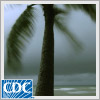Hurricane Season: Are You Ready?
This program is presented by the Centers for Disease Control and Prevention.
[Bret Atkins] Hurricanes are one of Mother Nature’s most powerful forces. People can be left confused and frustrated, homes and valuables can be destroyed, and lives can be lost. Natural disasters can happen anytime, anywhere, but they don’t have to catch you unprepared.
Hello, I’m Bret Atkins. With me today is Dr. Chris Portier, Director of CDC’s National Center for Environmental Health. Welcome, Dr. Portier.
[Dr. Chris Portier] Happy to be here, Bret.
[Bret Atkins] Let’s start with how we’re doing. Do you think the average American is prepared for natural disasters like hurricanes?
[Dr. Chris Portier] Yes and no. In some areas, Americans are well prepared, but in others they really aren’t. Families are able to cope better with emergencies if they have resources on hand, such as a three-day supply of food, water, and medications, and a written household evacuation plan. But not everyone is there yet.
[Bret Atkins] What’s the difference between a hurricane watch and hurricane warning?
[Dr. Chris Portier] A watch lets you know that the weather conditions are favorable for a hurricane to occur. It literally means "be on guard." A warning requires immediate action because hurricane conditions – that is, sustained winds of 74 miles per hour or higher – are expected. Both watches and warnings are important, but warnings should be considered urgent and people should be prepared before a warning is issued.
[Bret Atkins] What are the main threats that come with hurricanes?
[Dr. Chris Portier] Winds. Hurricanes can produce winds exceeding 155 miles per hour, causing catastrophic damage, not only to coastlines, but also several hundred miles inland. Floods, common to hurricanes, are very destructive and can be deadly. Hurricanes can also produce tornadoes which can destroy homes and cause flying debris that is extremely dangerous.
[Bret Atkins] When should hurricane preparation begin?
[Dr. Chris Portier] Hurricane preparation should always begin before the hurricane season, but it’s never too late. If you haven’t started yet, you can start today. For help getting ready, visit emergency.cdc.gov/disasters/hurricanes.
[Bret Atkins] Before a hurricane makes landfall, what are the most important steps we can take to protect ourselves?
[Dr. Chris Portier] There are a number of things that we can do to protect ourselves.
• Learn about your community's emergency plans, warning signals, evacuation routes, and where the emergency shelters are.
• If you have a smartphone, check for weather-related apps that you could use.
• Secure or protect any potential hazards in your home. Turn off electrical power when there is standing water, fallen power lines, or before you evacuate. Also, turn off gas and water supplies before you evacuate.
• Locate and secure important papers, such as insurance policies, wills, licenses, and stock certificates.
• Post emergency phone numbers at every phone.
[Bret Atkins] If people aren’t ordered to evacuate, how can they stay safe in their homes?
[Dr. Chris Portier] Here are some things that you can do:
• Turn on the radio or television for weather updates.
• If you use Twitter, find emergency feeds that pertain to you.
• Every loose item is a missile waiting to be launched. Secure outdoor items, such as bicycles, grills, and propane tanks, which may damage property.
• Cover windows and doors with plywood or boards.
• Even if the weather appears to have calmed, stay inside. Stay away from all windows and exterior doors. Take shelter in an interior bathroom or basement for protection from high winds and flying debris.
[Bret Atkins] We often forget to include pets in our emergency plan. What sort of arrangements should people make to ensure the safety of their pets?
[Dr. Chris Portier] Planning ahead is the key. Have water bowls, a manual can opener, and food and water for at least three days on hand for each pet. Contact hotels and motels outside your immediate area to check policies on accepting pets.
[Bret Atkins] Dr. Portier, thanks so much for joining us today.
[Dr. Chris Portier] Thanks, Bret. It was a pleasure.
[Bret Atkins] For more information on how you can prepare for hurricanes or other disasters, please visit emergency.cdc.gov or follow Dr. Portier on Twitter at cdc_drcportier.
For the most accurate health information, visit www.cdc.gov or call 1-800-CDC-INFO.



